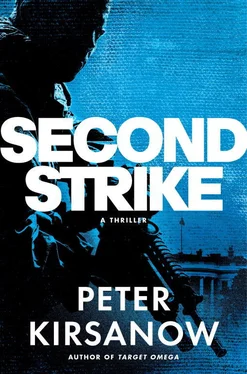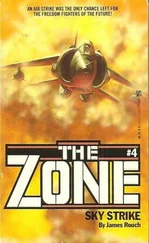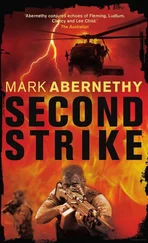“And?”
“I made contact with our friends and associates,” Garin informed him.
Dwyer understood from experience that Garin’s innocuous statement suggested such associates were no longer responsive. “Were you able to learn anything?”
“I have one of their phones,” Garin said, his tone suggesting he didn’t expect that phone to provide any useful information.
“What’s next?”
Garin thought briefly about checking on his sister, who lived twenty minutes southeast, but knew he couldn’t spare the time. “I’m at a dead end.”
“Why not go loud? They’ll be certain to come for you.”
“I just did that. I can’t stay here, though.”
“Last go-round most of the action was in the D.C. area. Why not come back?”
“I can’t fly out of here. And it would take six hours to drive.”
“Where are you right now?” Dwyer asked.
“About to take the I-71 to downtown Cleveland.”
“Go to Cuyahoga County Airport instead. In anticipation of your causing your usual mess, I’ve positioned one of our Bell 429s there, prepped, fueled, and ready to go.”
Garin shook his head slightly. “Either you’re getting very good at this or I’m getting very bad.”
“We’ll get you here in under two hours.”
“Good.”
“Nothing’s gonna happen before then, anyway.”
Garin wasn’t so sure.
GEORGIA,
AUGUST 15, 4:43 P.M. EDT
Ruth Ponder was beside herself.
In forty-four years of marriage she and Amos had been apart only two nights. Once when she had attended a cousin’s funeral in Columbus that Amos couldn’t attend because he had the flu. And another twelve years ago when his truck broke down in Savannah and he stayed overnight in a motel until the mechanic could finish his repairs.
He hadn’t called. By ten last night she’d already called their two daughters, who lived within twenty miles, as well as their son, who lived in Atlanta. None had heard from him.
She’d called the sheriff’s office, but they wouldn’t take a missing persons report unless twenty-four hours had elapsed. She didn’t care. She kept calling every hour and the last time made sure they took down the make and license number of his car. She called Amos’s best friend, Bob Lampley, but he hadn’t heard from him since the weekend. She called the local hospital, but since last night they had admitted only twin ten-year-olds with food poisoning.
Ruth hadn’t slept since the previous night. When she wasn’t pacing the kitchen floor she was sitting at the kitchen table wringing her hands, which she was doing at this very moment.
She looked at the clock above the sink. Something was wrong. Something was very wrong.
NORTH CAROLINA,
AUGUST 15, 4:45 P.M. EDT
Bor knew they needed to abandon the vehicles and obtain new ones. No one would be actively looking for them this far from northern Georgia, but it was likely someone had reported the young man and the old man missing and provided license numbers and descriptions of their respective vehicles.
Bor suspected the old man would be the first to be reported missing. The young man, likely a college student, probably had several previous escapades during which he couldn’t be reached; his short-term disappearance wouldn’t be unusual.
The volunteers, if not exactly encouraged by what they had recently witnessed, were scrupulously obedient. Baslaev’s death might not have been necessary, but it guaranteed their compliance and, therefore, the mission’s success.
Provided, of course, that the possible impediment—Mike Garin—was removed. Bor remained somewhat skeptical that Garin would be neutralized before the event. He knew the capabilities of his former Omega leader better than almost anyone, which was why he had insisted to Moscow that Garin be at least held in check, preferably permanently, while Bor executed his mission. The last mission, executed perfectly in every respect, had failed because Moscow had directed Bor to use Quds Force to handle Garin. Bor had objected strenuously to Stetchkin, but it was Mikhailov who was ultimately unmoved. It was part of the Russian president’s misdirection; he wanted the Iranians to believe they were full partners in the operation, not just pawns. In theory, the misdirection was brilliant. In practice, pitting the overmatched Quds Force against Garin proved a disaster.
The failure, however, was short-lived. In fact, the EMP operation was itself part of an elaborate misdirection. And now that Russian special operators were involved, the odds that Garin would at least be kept in check were good. Or better.
They were approaching the outskirts of another small town, crisscrossed by an interstate exchange. In America, Bor knew, these areas often were dedicated to all things automotive: auto-parts stores, auto-repair shops, and car dealerships. Sure enough, a mile later a used-car lot appeared on the right.
Bor directed the van’s driver to drive past the lot to the truck stop approximately an eighth of a mile down the road and park behind the diner. The LaCrosse followed suit.
Bor turned to Talib Nadir, one of the volunteers who had a driver’s license, seated behind him.
“You, come with me,” Bor commanded. “We have to switch vehicles. The rest of you wait here. We’ll return shortly.”
He had no concern they wouldn’t do exactly as ordered.
Bor pulled back the slide on the Glock to check the chamber, returned it to his waistband, and covered it with his shirt. The act was not lost on anyone in the van. All of them recognized it as the precursor to some poor soul’s imminent demise.
Bor got out of the van and motioned to the occupants of the LaCrosse to remain put. Talib in tow, Bor jogged the two hundred yards to the used-car lot, which, Bor quickly determined, held a variety of adequate vehicles. In a minute Bor identified a red 2000 Dodge Durango and a gray 2002 Chevy Tahoe as the group’s next transports. In the same time, a laconic salesman in jeans and a gray poplin jacket approached. Before he could say hello, Bor pointed to his selections.
“We’d like these two.”
The desultory salesman’s face broke into a broad grin. Bor had just made his day.
“Would you like to take them for a ride?”
“Nope. They look good to me. If we have a problem, I’ll just come back and shoot you.”
The salesman chuckled. “Sounds fair enough.”
“How much?”
“The price on the windshield. Twenty-five hundred for the Durango and seventeen eighty for the Tahoe.”
“No,” Bor said. “How much?”
“Thirty-five hundred for both?”
Bor nodded.
The salesman motioned toward a trailer in the front corner of the lot. “Follow me. We’ll take care of the paperwork and get you on your way in no time.”
The salesman led them to the trailer and up the two stairs to the sales office. It contained two desks, two filing cabinets, a desktop computer, and a coffeemaker. Behind the desk to the right was a pegboard from which scores of keys hung. The salesman swung behind the desk and took two sets of keys off the board. He slapped them atop the desk and extended his hand toward Bor.
“I’m Randy, by the way.”
Bor ignored the extended hand and glanced at the keys. Then back at the salesman. Talib saw a look of calculation in Bor’s eyes. The volunteer held his breath in anticipation as Bor reached behind his back. The salesman continued to stand with his hand extended as Bor took his wallet from his back pocket and pulled out a sheaf of bills.
“Skip the paperwork,” Bor said. “Five thousand cash for title and registration to both. Write it up any way you want to.”
Читать дальше












